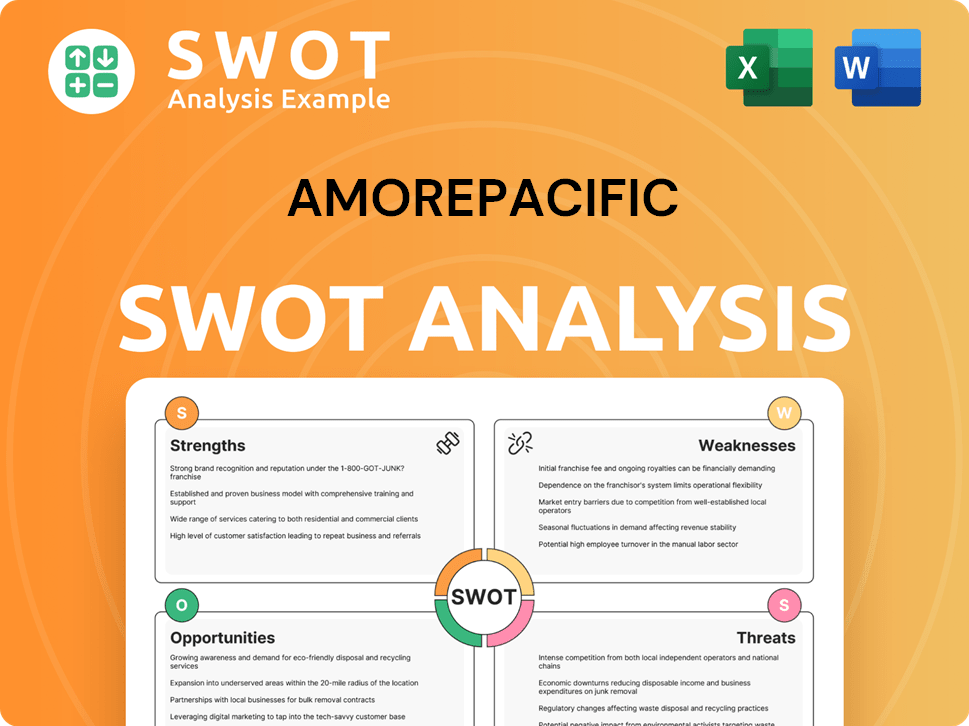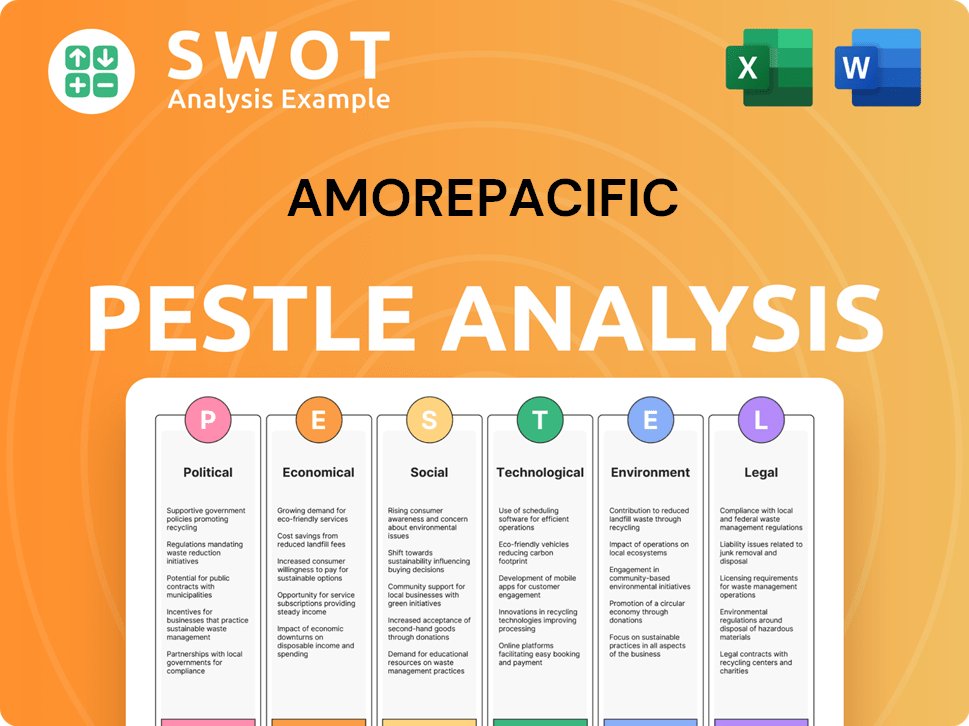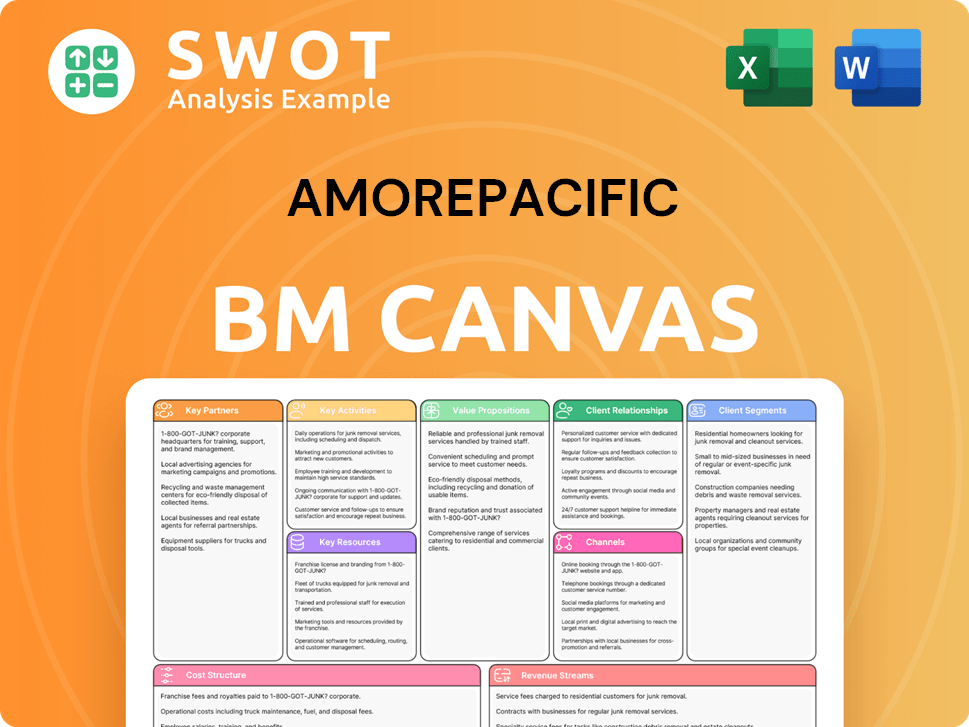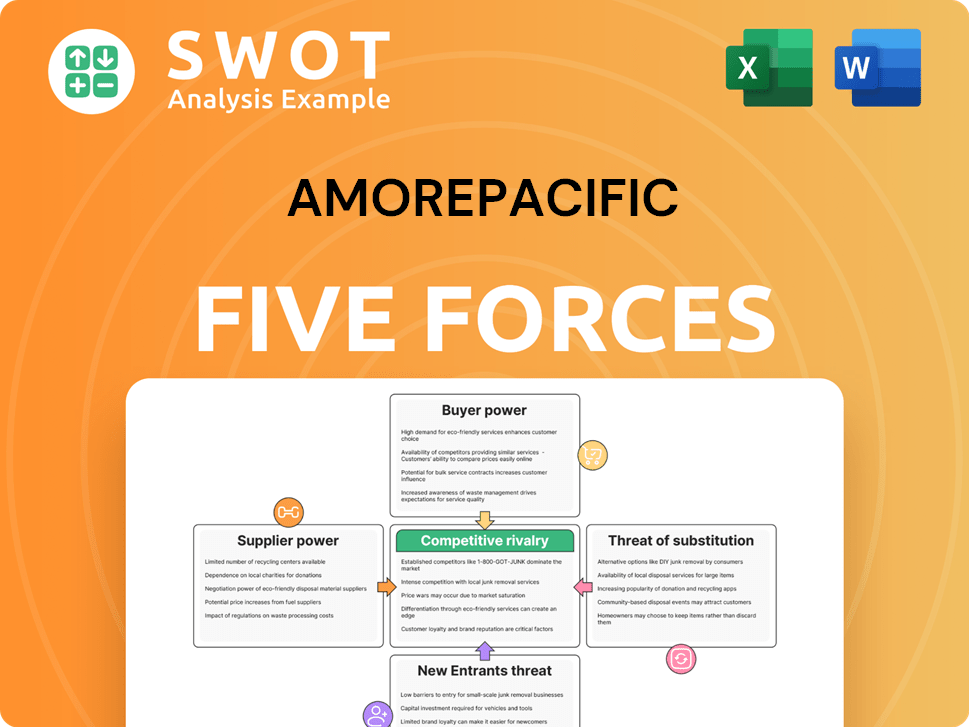Amorepacific Bundle
How Did Amorepacific Conquer the Global Beauty Market?
Journey back in time to uncover the Amorepacific SWOT Analysis and the fascinating story of a company that transformed from a small family business into a global beauty powerhouse. From its humble beginnings in 1932, selling camellia oil, to its current status as a leader in the South Korean cosmetics industry, Amorepacific's history is a testament to innovation and strategic vision. Discover the key milestones and challenges that shaped this iconic Korean beauty company.

The Amorepacific history is a compelling narrative of resilience and innovation within the cosmetics industry. Explore the Amorepacific company timeline, from its early days as 'Taepyeongyang' to its evolution into a global force in K-beauty. This article delves into the brief history of Amorepacific founder and examines the company's early years, including its Amorepacific product evolution and strategic expansion across international markets. Understanding the Amorepacific brand portfolio and Amorepacific financial history provides valuable insights into its sustained success as a Korean beauty company.
What is the Amorepacific Founding Story?
The story of Amorepacific, a leading Korean beauty company, began in 1932. It all started with Dokjeong Yun, the mother of the future founder, selling camellia oil in Gaeseong, Korea. Her dedication to quality set the stage for what would become a global cosmetics powerhouse.
In 1945, Sungwhan Suh, inspired by his mother and his experience with ginseng, took over the business. He named it 'Taepyeongyang' (Pacific Chemical Co. Ltd.), with a vision to expand beyond the Pacific. This marked the formal beginning of the company's journey in the South Korean cosmetics industry.
The roots of Amorepacific history are deeply intertwined with a commitment to innovation and customer satisfaction. The company's early approach focused on direct-to-consumer sales and a strong emphasis on research and development, which set it apart in the K-beauty landscape.
The company's initial focus was on creating beauty and health products. This early focus on innovation and research has been a key factor in its long-term success.
- In 1948, the company launched Melody Cream, its first branded product.
- In 1951, ABC Pomade, South Korea's first plant-based pomade, was introduced.
- The company relied on direct-to-consumer sales, which helped build its popularity.
- In 1954, Korea's first cosmetics research laboratory was established, highlighting a commitment to innovation.
Amorepacific SWOT Analysis
- Complete SWOT Breakdown
- Fully Customizable
- Editable in Excel & Word
- Professional Formatting
- Investor-Ready Format

What Drove the Early Growth of Amorepacific?
The early growth of Amorepacific, formerly known as Pacific Chemical, focused on scientific advancements and product innovation. This commitment led to the development of groundbreaking products and the establishment of a strong foundation in the South Korean cosmetics market. The company's expansion into international markets marked a significant turning point, transforming it into a global player in the cosmetics industry.
In 1954, Pacific Chemical established South Korea's first cosmetics research laboratory, emphasizing technology and natural ingredients. This focus led to the introduction of the world's first oriental medicine cosmetics, ABC Ginseng Cream, in 1966, which utilized ginseng. The company also pioneered the cultivation of a tea garden in 1979, which later became the foundation for a green tea-based skincare line.
Amorepacific began its international expansion in 1992, entering China shortly after diplomatic relations were established. A joint venture was set up in Shenyang in 1993, successfully launching premium moisturizing skincare products. In 2000, the company introduced the Laneige brand to Shanghai, further solidifying its presence in the Chinese market.
The company officially changed its name to Amorepacific in 2002 to facilitate global communication. In 2006, Amorepacific Group adopted a holding company structure to strengthen its core business capabilities and enhance corporate governance transparency. Leadership transitioned in 1997 when Sungwhan Suh handed the company over to his second son, Kyungbae Suh.
Under Kyungbae Suh's leadership, Amorepacific intensified its global expansion efforts, with its premium Laneige brand becoming available outside Korea in 2002. The company's global business recorded sales of KRW 1.6789 trillion in 2024, representing a 20.6% increase year-over-year. The Americas surpassed Greater China in annual sales for the first time in the group's history in 2024, with sales increasing by 83%. For more insights, explore the Marketing Strategy of Amorepacific.
Amorepacific PESTLE Analysis
- Covers All 6 PESTLE Categories
- No Research Needed – Save Hours of Work
- Built by Experts, Trusted by Consultants
- Instant Download, Ready to Use
- 100% Editable, Fully Customizable

What are the key Milestones in Amorepacific history?
The Amorepacific has a rich Amorepacific history, marked by significant milestones that have shaped its trajectory within the Korean beauty company landscape and the broader cosmetics industry.
| Year | Milestone |
|---|---|
| 1954 | Established Korea's first cosmetics research laboratory, a pioneering move in the South Korean cosmetics industry. |
| 1966 | Launched ABC Ginseng Cream, the world's first oriental medicine cosmetics product. |
| 1979 | Cultivated a tea garden, leading to the creation of the world's first green tea-based skincare line. |
| 2002 | Officially rebranded to Amorepacific, signaling its global ambitions. |
| 2006 | Joined the UN Global Compact, demonstrating a commitment to corporate social responsibility. |
| 2022 | Acquired the luxury clean beauty brand Tata Harper, expanding its portfolio. |
Innovation has been a cornerstone of Amorepacific's success, driving its evolution in the K-beauty market. The company's dedication to research and development has consistently led to groundbreaking products and technologies.
The establishment of Korea's first cosmetics research laboratory in 1954 was a pivotal moment, fostering early innovation. This commitment to research laid the foundation for future product development and market leadership.
In 1966, Amorepacific introduced ABC Ginseng Cream, the world's first cosmetics product based on oriental medicine. This innovation showcased the company's unique approach to beauty and skincare.
The cultivation of a tea garden in 1979 led to the creation of the world's first green tea-based skincare line. This innovation highlighted the company's focus on natural ingredients and sustainable practices.
Amorepacific is credited with introducing the 'cushion foundation,' an all-in-one makeup product combining makeup and skincare in a portable compact. This product has become a global beauty essential.
The rebranding to Amorepacific in 2002 and subsequent global initiatives, including joining the UN Global Compact in 2006, demonstrated the company's commitment to international markets and sustainable practices.
In 2025, Amorepacific received its sixth consecutive CES Innovation Award for its 'WANNA-BEAUTY AI' application. This demonstrates the company's continued investment in technology and personalized beauty solutions.
Despite its achievements, Amorepacific has faced challenges, particularly in the competitive global beauty market. Navigating cultural differences and economic fluctuations remains crucial for its continued success.
In 2024, while global sales saw growth, revenue in Greater China decreased by 27% to KRW 510 billion (USD 351.6 million). This decline was influenced by inventory adjustments on major e-commerce platforms and offline store optimization.
The beauty industry is highly competitive, requiring Amorepacific to continually innovate and adapt to changing consumer preferences. This includes responding to trends in both product development and marketing strategies.
The company is actively working on strengthening brand competitiveness and enhancing channel response, including partnerships with global platforms like Amazon and new growth channels such as TikTok Shop. This is key to maintaining market presence.
Amorepacific is focusing on leading global brands like LANEIGE and COSRX, nurturing next-generation brands such as AESTURA and HERA, and rebranding existing major brands like Sulwhasoo, INNISFREE, and Ryo. This is aimed at adapting to evolving consumer preferences.
The company is actively working on accelerating global rebalancing to address regional challenges and capitalize on new opportunities. This involves adjusting strategies in key markets to drive future growth.
Amorepacific's commitment to sustainable practices is evident through its membership in the UN Global Compact and its focus on eco-friendly initiatives. This approach is increasingly important in the beauty industry.
Amorepacific Business Model Canvas
- Complete 9-Block Business Model Canvas
- Effortlessly Communicate Your Business Strategy
- Investor-Ready BMC Format
- 100% Editable and Customizable
- Clear and Structured Layout

What is the Timeline of Key Events for Amorepacific?
The Amorepacific history is a testament to its growth and influence in the South Korean cosmetics and global cosmetics industry. From its humble beginnings selling camellia oil to becoming a leader in K-beauty, the company has consistently adapted and innovated. Key milestones include the establishment of Korea's first cosmetics research laboratory, the launch of groundbreaking products like ABC Ginseng Cream, and significant expansions into the Chinese market and beyond. The evolution of Amorepacific's brand portfolio reflects its commitment to innovation and meeting diverse consumer needs, establishing its current market position and impact on the K-beauty industry.
| Year | Key Event |
|---|---|
| 1932 | Dokjeong Yun begins selling camellia oil in Gaeseong, laying the foundation for the company. |
| 1945 | Sungwhan Suh establishes 'Taepyeongyang' (Pacific Chemical Co. Ltd.) in Seoul, South Korea. |
| 1954 | Establishes Korea's first cosmetics research laboratory. |
| 1966 | Launches ABC Ginseng Cream, the world's first oriental medicine cosmetic. |
| 1979 | Cultivates a tea garden, leading to green tea-based skincare. |
| 1992 | Enters the Chinese market. |
| 1997 | Kyungbae Suh takes over as CEO, initiating a multi-brand, global strategy. |
| 2000 | Establishes the Korea Breast Cancer Foundation. |
| 2002 | Company name officially changes to Amorepacific. |
| 2006 | Adopts a holding company structure and declares its vocation as 'Asian Beauty Creator'. |
| 2010 | Builds a second R&D center. |
| 2022 | Acquires luxury clean beauty brand Tata Harper. |
| 2024 | Launches new high-efficacy, high-end skincare brand, AP Beauty, in January. |
| 2024 | Amorepacific Group records sales of KRW 4.2599 trillion and an operating profit of KRW 249.3 billion. |
| 2025 | Receives its sixth consecutive CES Innovation Award for 'WANNA-BEAUTY AI'. |
Amorepacific is focused on strengthening its brand portfolio to meet evolving consumer demands. This includes innovation in product development, marketing strategies, and enhancing brand image. The goal is to ensure each brand remains competitive in the dynamic cosmetics industry.
The company aims to expand its presence in key strategic markets such as the United States, Japan, Europe, India, and the Middle East. Simultaneously, Amorepacific will work on structural normalization in the Chinese market to optimize its global footprint.
Amorepacific is reinforcing its partnerships with major retail channels like Sephora while exploring new growth avenues, including the TikTok Shop. This multi-channel approach is designed to improve accessibility and reach diverse consumer segments.
The company is investing in customer service innovation and operational productivity through digital technologies, including AI. Amorepacific's CES 2025 showcase highlights its commitment to integrating technology into beauty solutions. As of March 31, 2025, Amorepacific's trailing 12-month revenue was $3.17 billion.
Amorepacific Porter's Five Forces Analysis
- Covers All 5 Competitive Forces in Detail
- Structured for Consultants, Students, and Founders
- 100% Editable in Microsoft Word & Excel
- Instant Digital Download – Use Immediately
- Compatible with Mac & PC – Fully Unlocked

Related Blogs
- What is Competitive Landscape of Amorepacific Company?
- What is Growth Strategy and Future Prospects of Amorepacific Company?
- How Does Amorepacific Company Work?
- What is Sales and Marketing Strategy of Amorepacific Company?
- What is Brief History of Amorepacific Company?
- Who Owns Amorepacific Company?
- What is Customer Demographics and Target Market of Amorepacific Company?
Disclaimer
All information, articles, and product details provided on this website are for general informational and educational purposes only. We do not claim any ownership over, nor do we intend to infringe upon, any trademarks, copyrights, logos, brand names, or other intellectual property mentioned or depicted on this site. Such intellectual property remains the property of its respective owners, and any references here are made solely for identification or informational purposes, without implying any affiliation, endorsement, or partnership.
We make no representations or warranties, express or implied, regarding the accuracy, completeness, or suitability of any content or products presented. Nothing on this website should be construed as legal, tax, investment, financial, medical, or other professional advice. In addition, no part of this site—including articles or product references—constitutes a solicitation, recommendation, endorsement, advertisement, or offer to buy or sell any securities, franchises, or other financial instruments, particularly in jurisdictions where such activity would be unlawful.
All content is of a general nature and may not address the specific circumstances of any individual or entity. It is not a substitute for professional advice or services. Any actions you take based on the information provided here are strictly at your own risk. You accept full responsibility for any decisions or outcomes arising from your use of this website and agree to release us from any liability in connection with your use of, or reliance upon, the content or products found herein.